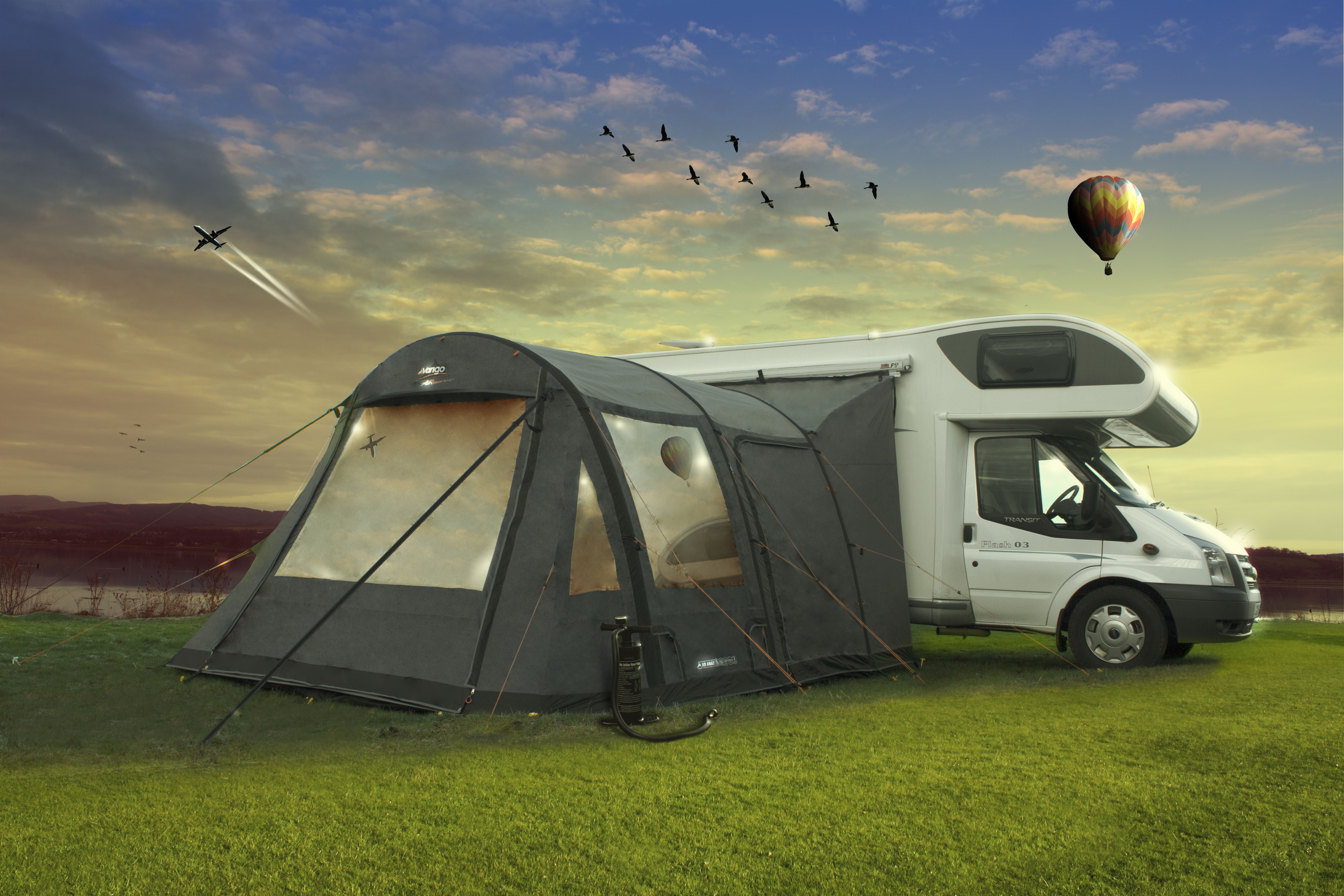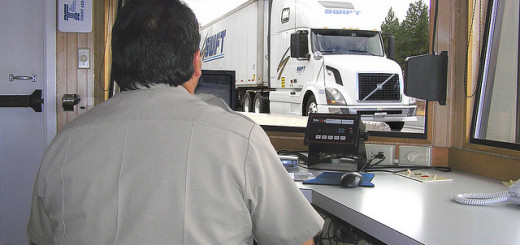Living in a Small Motorhome
Fulltiming in RVs isn’t exactly a new concept, but it has grown a lot more popular in recent years. All sorts of people choose to go full time for one reason or another, but it’s particularly popular among retirees who discover that living in an RV is a lot cheaper than living in a house. Living in an RV also has an added benefit that snowbirds discovered a long time ago, in that it’s exceedingly easy to pick up stakes and move somewhere warmer, or more interesting, whenever you feel like it.
Most full timers choose large motorhome and fifth wheels, which often provide as much or more living space than you’d have in a typical apartment or condo, but that doesn’t mean you can’t go full time in a small motorhome. There may be more challenges involved, but the results can be even more rewarding.
Going Full Time Without Breaking the Bank
Big diesel pushers and fifth wheels are great, but rigs like those aren’t exactly in everyone’s budget. You can easily spend over a million dollars on a high end diesel pusher, for instance, and then the costs associated with driving, maintaining, and even parking large motorhomes and towables can add up. Small motorhomes, on the other hand, are much more affordable, often cheaper to drive and maintain, and much easier to take off the grid and go boondocking if the mood should strike.
Of course, trying to live in a small motorhome does come with a unique set of challenges. Downsizing into a large diesel pusher can present enough problems, so how in the world are you supposed to cram all of your worldly possessions into a space that may well be smaller than the living room in your old house?
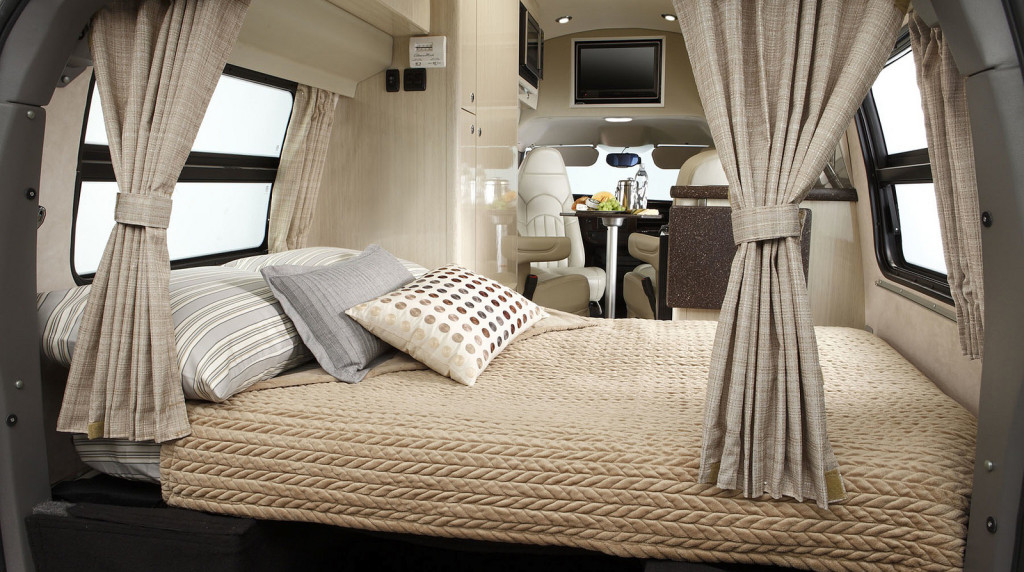
Class B motorhomes provide very little interior living space, so it’s important to make the most of what you have. Image courtesy of James Joel, via Flickr (Creative Commons 2.0)
Smart Packing and Efficient Living
The key to living full time in a small RV is to remember this one inescapable fact: you can’t take it all with you. If you’ve accumulated a lot of stuff, and you just can’t bear to part with it all, then a storage unit may be in your future. If it’s something that you absolutely can’t get rid of, but you don’t need it on a daily basis, then stick it in the storage unit. The fact is that there is a severe dearth of usable space in most small motorhomes, so you seriously have to prioritize what you take along and how you organize what you do bring.
Think long and hard about what you stick in storage, though. After a few years of living comfortably in your small rv, you may take a look at everything you stored away because you, “absolutely couldn’t get rid of it,” and wonder if it was really worth the hundreds, or even thousands, of dollars to hang on to it.
As far as what you really need to live in a small motorhome is concerned, you’ll want to stick to the basics. Things like;
- Clothing for all types of weather you’ll encounter in your travels.
- Dishes, cooking utensils and silverware, unless the plastic stuff is good enough.
- Basic toiletries.
- Linens.
- Groceries.
- Personal belongings you can’t do without.
The Importance of Organization
If you’re a disorganized person, or you feel like you can’t get and stay organized, then living in a small motorhome probably won’t be the best experience for you. It’s very hard to overemphasize the importance of organization when living in a small motorhome, simply because of the relative lack of space. Regardless of what, exactly, is on your personal packing list, you have to categorize everything and find a place for it, or you will quickly find your limited living space overrun by junk.
Some useful tips for organizing your belongings in a small motorhome include:
- Take stock of your available storage space, including cabinets, closets and drawers, and determine how to use every square inch of available room.
- Place your belongings into categories and store them accordingly. This will make it easier to put things away when you’re done with them.
- Make better use of the available space in cabinets, closets and drawers by storing your belongings in boxes, bins and other storage containers.
- Utilize temporary cabinet/door hooks to hang belongings like bags and clothing.
- Maximize your grocery storage space by removing individually packaged items from large packaging, and also by dividing items into individual baggies and other containers.
Living in a Smaller Space
One of the biggest challenges of going full time in a small motorhome is simply living in such a small space. This is unlikely to be a huge issue if you live by yourself, but if you’re fulltiming with a spouse, or even with a spouse and kids, cramped quarters can lead to clashing personalities and short tempers very quickly. Sartre said that hell is other people, but if you’re an RVer, then you know that hell is other people when it’s raining outside and you’re cooped up in a tiny motorhome and whose idea even was this.
Weather permitting, one of the keys to living in a smaller space is to take advantage of the great outdoors. After all, if you wanted to sit around your house all day, why did you decide to go full time in the first place? Sure there will be times when you want to just veg out on the couch (if your rig even has one), but while you’re travelling around the country, why not get out and actually see it?
When you are stuck in your rig, whether it’s with your spouse, your kids, or whoever else you’re living and travelling with, it’s important to remember that being stuck in a confined space can lead to difficulties, and the only way to really mitigate that is to be mindful of the people you are sharing your space with. A lot of this comes down to exactly how small you decided to go, since there’s a huge difference between being cooped up in a tiny class B rig and living in a small diesel pusher.
If you’re fulltiming in a class B motorhome, then you may find yourself with only one comfortable chair, or it may be difficult to even move around inside the rig without bumping into each other. In that case, it’s even more vital to think about how your actions—like hogging the only good chair—affect everyone else.
Dealing with Groceries and Cooking in a Small Motorhome
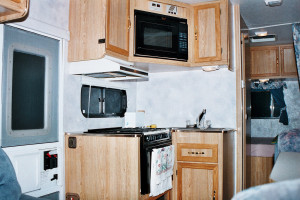
Small class A and class C rigs often have ovens and microwaves, but the available space for cooking is still limited. Image courtesy of Lee Bennett, via Flickr (Creative Commons 2.0)
Another challenge associated with living in a small motorhome is how to deal with groceries and cooking. Few small motorhomes have pantries, and those that do have small pantries, so groceries often have to vie for storage space with everything else. Since you have limited space to store anything, let alone food, you may find yourself shopping more often than you did when your house didn’t have wheels. In fact, you may find it useful to plan our your meals, at least roughly, before you go shopping, so that you end up with enough food to last a while without dealing with the issue of where you’re going to store everything.
How you cook in your motorhome will depend on the facilities you have to work with. The smallest class B motorhomes often have a tiny sink, compact fridge, and a “stove” that looks more like a hot plate, while small class C and class A motorhomes usually have a three or four burner stove, oven, and even a microwave.
In any case, you will find that “one pot meals” become your best friend, or “two pot meals” if you have the space. Not only are simple meals easier to prepare when you’re living in a small motorhome, but they’re also easier to clean up after and require fewer cooking utensils, which is great when space is at such a premium.
Another option for cooking in a small motorhome is a crock pot. Although you may be loathe to add more appliances to your packing list, crock pot dinners can really cut back on the workload, which is great when you’re working with such a small kitchen. If you have an inverter, or a 12V crock pot, you can even set up your meal so that it’s ready when you arrive at your destination.
The Importance of a Good Night’s Sleep
We spend a huge amount of our lives in bed, but the importance of a really good night of sleep often gets swept under the rug when it comes time to choose a new RV. And if you end up with a rig where it’s impossible to get comfortable at night, then living in your small motorhome is going to turn into a special kind of torture before long.
Bedding in small motorhomes runs the gamut, so you’ll want to pay special attention to what you’re working with before you decide to go full time. If you’re going with a small class B motorhome, for instance, your bed will probably be some kind of convertible jackknife sofa. These can be comfortable, but you can’t just take that for granted.
If you’re still shopping for a new rig, then you’ll want to actually fold the bed down and lay on it, with your partner if you have one, to get an idea as to how comfortable it will be. And if you already have a rig, then you’ll want to think about how comfortable the bed really is, and whether you’ll be able to stand sleeping on it every night in the foreseeable future.
Small class C and class A motorhomes, let alone small diesel rigs, are a totally different story. In most cases, these motorhomes will have at least a queen size bed, and if the mattress isn’t comfortable, you may be able to replace it with a normal residential mattress. Of course, you’ll want to actually measure first, since some RV mattresses are non-standard sizes.
Some small class C motorhomes, particularly “party models” don’t come with a bedroom. These rigs typically have some combination of a fold-out sofa bed, a dinette bed, and an overhead bunk. In many cases, the largest bed is in the overhead bunk, but you may or may not be able to stand sleeping in such cramped quarters every single night.
Choosing Your Full Time Small Motorhome
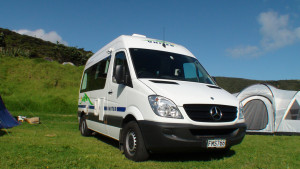
Class B motorhomes are easy to drive and maneuver, but they don’t make the best full time rigs. Image courtesy of studio tdes, via Flickr (Creative Commons 2.0)
With all of that in mind, it’s probably pretty clear that some small motorhomes are better suited to full timing than others. While it is possible to go full time in a class B motorhome, the amount of storage and living space is going to be a huge problem for a lot of people. If you’ve never camped in a class B before, you may want to give it a shot with a rental first.
Of course, that holds true with every class of motorhome. If you don’t have a whole lot of experience camping, then you definitely shouldn’t just go in blind. Identify a few potential rigs, find the closest thing out there in the rental market, and give it a test run before you pack everything away and hit the road.
For more information about different kinds of small motorhomes, check out:
And if you’re totally new to this whole motorhoming thing, you may even want to start with our motorhome class primer.

